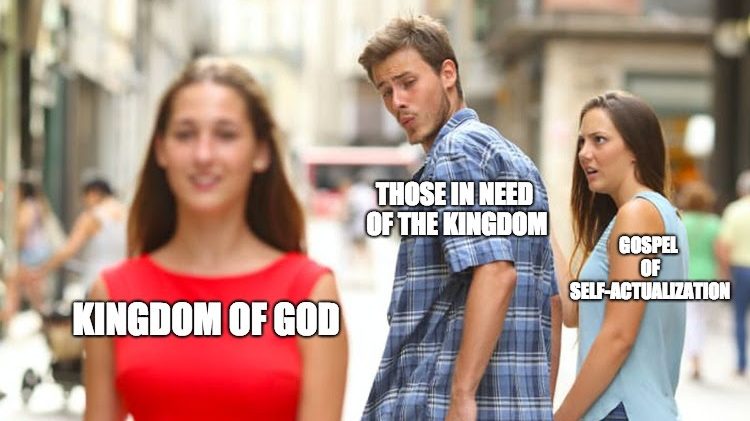Liturgy: “Becoming Memes of the Kingdom”
Each of us is familiar with these actions: caring for the poor and weak, shouldering one another’s burdens and the like. In fact, due to the impact of Christianity in the West, the goodness of these actions is almost assumed in our society.

What is the King’s Liturgy? King’s Liturgy defines our experience together as a Christian community. It outlines the rhythms we celebrate with the Church at large: Scripture readings, Sabbath habits, and celebration of Holy Days and historical events.
This Week’s Lectionary Readings
Proverbs 31:10-31
Psalm 1
James 3:13-4:3
Mark 9:30-37
This week’s liturgy is contributed by Benjamin White, instructor of biblical studies:
Daphne Hampson once said that the Christian life is like “living on a dare.” You get a glimpse of what she means in our texts for this week. Our world offers a gospel of self-actualization, a life in pursuit of your goals, desires, and concerns. But these texts remind us that the good life is an other-focused life, where you do as much good as possible for as many people as possible. This includes serving those who can give you nothing in return.
The woman in Proverbs 31 is encouraged to produce goods for those within (v. 11-15) and outside (v. 16-20) of her home. In Psalm 1, the godly person is likened to a tree that produces fruit (v. 3) for the enjoyment of others. James explicitly condemns the harboring of “selfish ambition”(v. 14). This culminates in the final reading, where Jesus urges the disciples to be first by being last and to welcome “little children” (Mk. 9.37).
Jesus draws our attention to children because it is these members of society who contribute little to the bourgeois lifestyle. Young children have little status, offer no promotions, take more than they give. By suggesting that God identifies with children, rather than a powerful ruler, Jesus introduces an unsettling component of God’s kingdom: the incongruous act, i.e. an action that defies typical evaluations of worth.
Each of us is familiar with these actions: caring for the poor and weak, shouldering one another’s burdens and the like. In fact, due to the impact of Christianity in the West, the goodness of these actions is almost assumed in our society.
But biblical spirituality offers a distinctive rationale for an other-focused life that is at once more challenging and more empowering. In each of the four biblical books mentioned above, God cares for humanity with an incongruous love. We are broken, but he redeems; we rebel, but he pursues; we curse, but he blesses (Ps. 2.7-9; Jas 2.5; Mk. 1.40-45). Even in Proverbs, a document which seems like a simple collection of rules for life, the author begins by depicting God as divine Wisdom, calling out amidst the noisy streets to a people who are too busy to hear her insights (1.21). When Scripture calls us to care for the helpless and broken, it does so because God first did this for us. We are to love incongruously because God has given us the incongruous gift of Jesus Christ. Most importantly, this reflection of God’s character isn’t meant to be a “one hit wonder”. Jesus identifies with a little child and, in doing so, suggests that incongruous acts are central to living a distinctively Christ-like life.
Think of it in this way: Jesus is inviting you to become a meme of the Kingdom of God. A living, moving, breathing meme. This might seem like an odd suggestion, especially when many internet memes are frivolous, and many border upon the ridiculous. But this is precisely the point. When we see an online meme, it immediately offers a distinctive message that is potent and unmistakable. The creator has made their point, and it elicits a strong reaction in us, whether laughter, anger, or even tears. God is inviting us to do this for him. To embody his love without respect for wealth, gender, or any kind of status. In doing so, we become a meme of the Kingdom, representing for the world what is distinctive about our God. If you choose to live the dare, to embrace this new way of life, you may find—as I so often have—that the other-focused life concerns your flourishing too. As we learn to care for others, our joy is paradoxically increased by theirs. Jesus’s cross destroys the divide between what is good for you and good for others.




